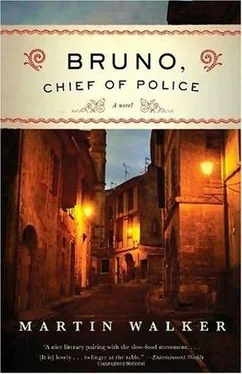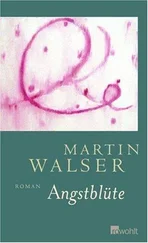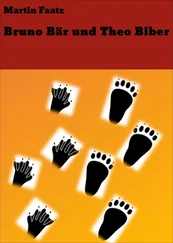Martin Walker - Bruno, chief of police
Здесь есть возможность читать онлайн «Martin Walker - Bruno, chief of police» весь текст электронной книги совершенно бесплатно (целиком полную версию без сокращений). В некоторых случаях можно слушать аудио, скачать через торрент в формате fb2 и присутствует краткое содержание. Жанр: Полицейский детектив, на английском языке. Описание произведения, (предисловие) а так же отзывы посетителей доступны на портале библиотеки ЛибКат.
- Название:Bruno, chief of police
- Автор:
- Жанр:
- Год:неизвестен
- ISBN:нет данных
- Рейтинг книги:3 / 5. Голосов: 1
-
Избранное:Добавить в избранное
- Отзывы:
-
Ваша оценка:
- 60
- 1
- 2
- 3
- 4
- 5
Bruno, chief of police: краткое содержание, описание и аннотация
Предлагаем к чтению аннотацию, описание, краткое содержание или предисловие (зависит от того, что написал сам автор книги «Bruno, chief of police»). Если вы не нашли необходимую информацию о книге — напишите в комментариях, мы постараемся отыскать её.
Bruno, chief of police — читать онлайн бесплатно полную книгу (весь текст) целиком
Ниже представлен текст книги, разбитый по страницам. Система сохранения места последней прочитанной страницы, позволяет с удобством читать онлайн бесплатно книгу «Bruno, chief of police», без необходимости каждый раз заново искать на чём Вы остановились. Поставьте закладку, и сможете в любой момент перейти на страницу, на которой закончили чтение.
Интервал:
Закладка:
They found pay slips with Boudiaf’s name, movement orders for Villanova’s unit, payroll listings that included Boudiaf and Barakine, and requisitions for special equipment that included explosives and extra fuel to destroy ‘terrorist support bases’. The curator, cross-checking with the records of the Force Mobile’s pay office, found a record of Boudiaf’s promotion to squad leader in May, after one of Villanova’s trucks was destroyed in a Resistance ambush. The promotion listing included a new Milice pay book and identity card, complete with photograph, that had never been collected by Boudiaf. The Milice records stopped in June 1944, with the Allied invasion of Normandy and the complete collapse of the Vichy regime.
Bruno and Isabelle went through the Force Mobile mission reports, the punitive sweeps – staged from the Pйrigueux base – north into the Limousin region, west to the wine country of St Emilion and Pomerol, east toward Brive and south into the valleys of the Vйzиre and the Dordogne. They hit the region around St Denis in late March of 1944, raiding farms where the sons had failed to appear for forced labour service. They hit again in early May, based on intelligence from interrogations of Resistance prisoners after a Wehrmacht anti-partisan force, the Bohmer division, had surprised and destroyed a Maquis base in the hills above Sarlat. Bruno noted the names of the interrogated prisoners, who had all been shot; the names of the families listed as having sons who failed to appear for the STO, and the names of the towns and hamlets where the Force Mobile had been deployed. St Denis was not among them, but the surrounding hamlets of St Fйlix, Bastignac, Melissou, Ponsac, St Chamassy and Tillier had all been raided.
They spread out the photographs on the curator’s desk and compared them. There was no doubt that Hussein Boudiaf the footballer was also Hussein Boudiaf the newly promoted squad leader of the Force Mobile. And if he was not also Hamid al-Bakr then it was his double. But all bureaucracies tend to operate in the same way. The French Army pay book contained two thumb prints of al-Bakr, and the Milice pay book had been designed in precisely the same format and contained two thumb prints of Boudiaf. They were identical. The dates and place of birth were also identical, 14 July 1923, in Oran, Algeria. Only the addresses were different. Boudiaf’s address was given as the police barracks in Pйrigueux, not as Marseilles.
‘So that’s our murder victim,’ said J-J. ‘The bastard.’
‘Just one moment,’ said the curator, and went to a large bookshelf where he removed a fat volume. He began leafing through the index, and then looked up with satisfaction. ‘Yes, I thought I remembered that. Rue des Poissoniers was part of the Vieux Port of Marseilles that was destroyed in the bombing before the invasion, which makes it a useful address for someone who wanted to hide his true identity.’
They went back to the Force Mobile mission reports, signed by Villanova. The raids around St Denis on May the eighth had included squad leader Boudiaf’s unit. They claimed to have destroyed fourteen ‘terrorist supply bases’, which meant farms. May the eighth 1944, thought Bruno, the day that France celebrated her part in the victory that came exactly a year after the Force Mobile raided the outlying hamlets of the Commune of St Denis. He would never think of the annual May parade at the town war memorial in quite the same way again.
Suddenly, a memory came to him in a series of distinct but clear images, almost like the frames of a comic book or a film in slow motion. This year’s parade, just three days before Hamid’s murder, and Hamid in the crowd with his family, proudly watching Karim carry the flag to the war memorial. Hamid, who had been a recluse, never seen in the town, never going to the shops or sitting in the cafй to gossip or playing petanque with the other old men. Hamid, who had mixed only with his own family and kept himself carefully out of sight. And then Jean-Pierre from the bicycle shop and Bachelot the shoemender, the two Resistance veterans who never spoke but who carried the flags side by side at each May the eighth parade… In his mind’s eye, he clearly saw them at this year’s parade, saw that moment when he noticed them staring intently at one another in unspoken communication. He saw the Englishman’s grandson playing the Last Post, remembered the tears it brought to his eyes, and recalled his conclusion that Jean-Pierre and Bachelot had connected through the music and the memory. Perhaps that was not the connection at all…
Bruno played each scene back carefully in his mind, then he went to the interrogation reports that came from the prisoners taken by the Bohmer division.
He examined the list of captured men who were to be shot. The third name was Philippe Bachelot, aged nineteen, of St Fйlix. Jean-Pierre’s family name was Courrailler, but he found no Courrailler in the list of prisoners. There was still a branch of the Courrailler family, though, in Ponsac, where they kept a farm, and a daughter who ran the kennels, breeding Labradors. He knew the farm, because it was one of the few places new enough and wealthy enough to have installed a special barn with white tiles that met European hygiene codes. Bruno excused himself and stepped out from the Archives and down the stairs, through the museum and into the open air of the square. There he took out his mobile phone to call the Mayor.
‘It’s him all right, Sir,’ Bruno told Gйrard Mangin. ‘Photograph and thumb print. Hamid al-Bakr was also Hussein Boudiaf of the Force Mobile, a squad leader who burned a lot of farms in our Commune in May of 1944. There’s no question about it, the evidence is solid. But it gets worse. One of the farms that was hit was that of Bachelot’s family, after they interrogated his elder brother. Another was in Ponsac, and I think it was the Courrailler farm, but could you get someone to check the compensation records in the Mairie archives?
I remember that the families all got some kind of compensation after the war.’
‘That’s right,’ said the Mayor. ‘There was a lawsuit in the Courailler family about who got what after the Germans paid over a lot of money for war damages.
All I recall is that half the family still doesn’t speak to the other half because of the lawsuit, but I’ll get hold of the full list and call you back. Is this leading where I think it is, towards Bachelot and Jean-Pierre?’
‘It’s too soon to say, but I’m not with the police team now. I’m taking a walk outside on my own. This part is between you and me; it’s town business. When I go back into the Archives I assume we’ll just collate all the evidence, make copies and get them certified by the curator. And of course we’ll collect the names of families who were victimised by the Force Mobile. We could end up with a long list of possible suspects and it could take some time. A lot of potential witnesses have died and memories aren’t what they were.’
‘I understand, Bruno. You will be back in time for tomorrow’s parade?’
Tomorrow was the eighteenth of June, the anniversary of the Resistance, of de Gaulle’s message from London in 1940 for France to fight on, for she may have lost a battle but she had not lost the war. Bachelot and Jean-Pierre would carry the flags, just like always.
‘I’ll be there, Sir. And everything is in order for the firework display tomorrow night.’
‘Let’s hope those are the only fireworks we get,’ said the Mayor. With a heaviness in his step but a sense of justice in his heart, Bruno went back into the building.
CHAPTER 25
They drove back in convoy to the police headquarters in Pйrigueux, Bruno riding with J-J and Isabelle following behind with thick files of photocopies in the back of her car. He would have driven with Isabelle but J-J held open the passenger door of his big Renault and said, ‘Get in.’
Читать дальшеИнтервал:
Закладка:
Похожие книги на «Bruno, chief of police»
Представляем Вашему вниманию похожие книги на «Bruno, chief of police» списком для выбора. Мы отобрали схожую по названию и смыслу литературу в надежде предоставить читателям больше вариантов отыскать новые, интересные, ещё непрочитанные произведения.
Обсуждение, отзывы о книге «Bruno, chief of police» и просто собственные мнения читателей. Оставьте ваши комментарии, напишите, что Вы думаете о произведении, его смысле или главных героях. Укажите что конкретно понравилось, а что нет, и почему Вы так считаете.












